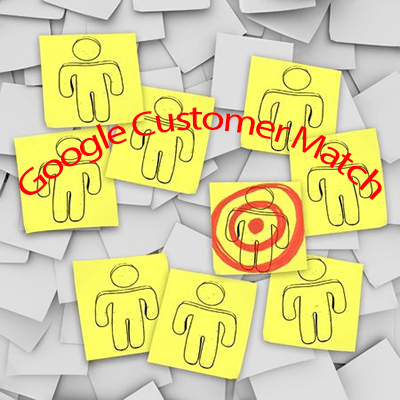
On its surface, the proposed Google Customer Match appears to be a powerful marketing tool for you to use in your online business by taking advantage of existing email lists.
How Google Customer Match Will Use Your Email Lists
As explained by Ginny Marvin at MarketingLand.com in Google To Let Advertisers Upload And Target Email Lists In AdWords With Customer Match, this “marks the first time Google has allowed advertisers to target ads against customer-owned data in AdWords. Google matches the email addresses against those of signed-in users on Google. Individual addresses are hashed and anonymized. Advertisers will be able to set bids and create ads specifically geared to audiences built from their email lists.”
In other words, you’ll be able to take email lists of existing customers and prospects who have opted in, upload those lists to Google, and target market to them using AdWords. You will also be able to market to similar demographics based on this email data.
Using Your Email Lists to Market through Facebook and the Wall Street Journal
As noted by Rolfe Winkler and Jack Marshall in their Wall Street Journal article Google May Offer New Way to Target Ads, Google’s new program is similar to Facebook’s existing “custom audiences” program. According to Winkler and Marshall, Rupert Murdoch’s News Corp, the publisher of the Wall Street Journal, is also considering a similar type program for targeted marketing.
Can You Legally Use Your Email Lists in These Targeted Marketing Programs?
It depends primarily upon two factors:
(1) subscriber consent; and
(2) your autoresponder service’s terms and conditions.
Email Lists and Subscriber Consent
The terms under which subscribers opted into your email lists may determine whether or not you can share their email addresses with Google or another third party marketing and advertising resource. For example, if you promised not to share the data with third parties, you’re going to need to obtain consent to now share it.
Email Lists and Your Autoresponder’s Terms and Conditions
If you’re hosting your own lists in-house, this is a non-issue. However, many companies use third party autoresponder/CRM services for list-building. Examples of third party providers include AWeber and InfusionSoft.
The terms and conditions imposed by third party autoresponder/CRM services on email list use can restrict your ability to share email addresses with other third parties, such as Facebook, Google, and News Corp.
Email Lists and Intellectual Property Ownership
For Google Customer Match and programs like it, you should also read and understand the terms and conditions imposed upon uploading your email lists for use in targeted marketing. What intellectual property rights will you be giving away to your lists? Will Google receive a license to your email lists? If so, what does it cover?
Of course, to avoid issues with privacy laws, consumer protection laws, unsolicited commercial email (spam) laws etc. involving your email lists, consult with a qualified Internet lawyer before handing over your email subscriber lists to any third party.
[optin-cat id=7577]
